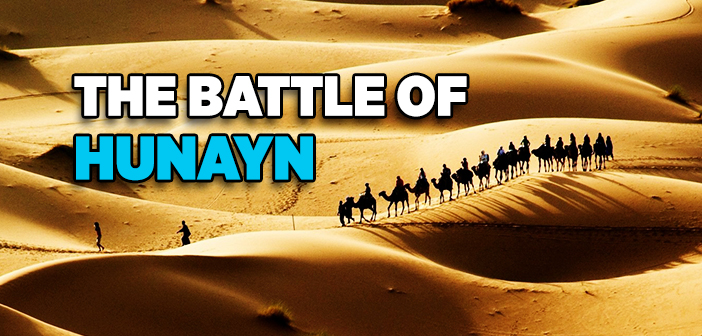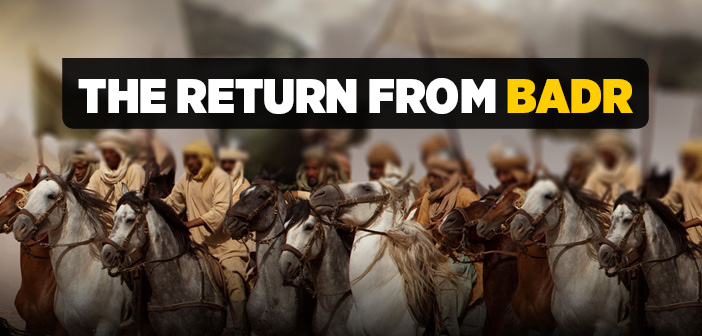What is battle of hunayn? What happened in battle of hunain?
The Blessed Prophet not only destroyed the idols in and around Kaabah, he also sent units to rid the surrounding towns of these lifeless stones of idolatry. A purification of tawhid had begun.[1] The tribe of Hawazin of Hunayn and the Banu Thaqif of Taif could not stomach this, however, and they decided to launch an attack against the Believers. Preparing a huge army, they set out, bringing along all their belongings with them, as if they had embarked on a battle of life and death.[2]
Learning of their preparation to attack, the Blessed Prophet -upon him blessings and peace- responded by preparing the army of Believers, enlisting another two-thousand Meccans who had recently become Muslim. How ironic a Divine manifestation it was that Abu Sufyan, who had fought the Believers for years in the name of idols, causing them much grief and torment in the process, was now also marching along as a Believer in the Muslim army, ready to fight this time for Islam. The army even included around eighty Meccan idolaters.[3]
In all respects, the Muslim army looked invincible, marching towards Hunayn with a dazzling splendor. Never before had Arabia seen an army so well equipped and organized, people thought. And for a moment, the magnificent scene allowed a dust of pride to creep in to the Companions’ hearts. Supposing ‘such an army could never be defeated’, they began belittling the enemy and thought a victory was certain on their physical power alone. It was this moment of pride and vanity that subjected the Believers to undergo a severe Divine test:
In the dark of the night, still a while before dawn, as the vanguard forces of the Muslim army were advancing with self-confidence along the narrow straits leading to Hunayn, they were suddenly ambushed by the enemy who had been lying in wait. Panic and disarray took over thereafter. The Believers were thwarted by a barrage of arrows shot at them from who knows where and found themselves in a state of hesitancy, leading not long after to an almost irrevocable state confusion and disorder, which soon took equal hold of the rear forces. The Muslims were forced to retreat but Hawazin and Banu Thaqif were eagerly pursuing them, with no intention of halting the chase.
It was only the Blessed Prophet -upon him blessings and peace- who courageously stood his ground amid the disastrous disarray, constantly advancing his mount deeper into the enemy ranks, virtually throwing himself right in their middle. The Prophet of Allah -upon him blessings and peace- that day exhibited a matchless spectacle of bravery and valor, in spite of the desperate efforts of both his uncle Abbas and Abu Sufyan -Allah be well-pleased with them-, clutching the reins of his mount to stop him advancing any further, lest something would happen to him.[4]
The confusion of the Muslim army was meanwhile continuing, showing no signs of recovery. “The spell has been broken today”, some were heard shouting, while others cried out in despair “only by making it to the sea can we stop this routing!” Even heard from the Meccan ranks were rumors that “the Prophet had been killed and that the Arabs would soon be returning to their religion of old!”
Yet, the Blessed Prophet -upon him blessings and peace- was alive and well, standing strong on his mount, adamantly resisting the enemy. His trust placed, as always, in the Almighty, he was calling out to his Companions:
“Ansar…Muhajirun! The servants of Allah! Come here! I am the servant and messenger of Allah!”
He then signaled Abbas -Allah be well-pleased with him-, known for his strong voice, to continue calling out to Muslim soldiers. At the top of his voice, Abbas -Allah be well-pleased with him- shouted, “Those who pledged at Aqabah…Those who pledged under the tree of Ridvan! Run! The Messenger of Allah is here!”
The Companions, hearing the echoes of the call, ran next to the Blessed Prophet -upon him blessings and peace-. Like butterflies, momentarily swung about by a forceful gale, they had regathered around an attracting light. The Believers’ hearts, united once more around the Prophet of Allah -upon him blessings and peace-, were cleansed of their previous fears and reinstated with their former peace. With the grace of Allah, glory unto Him, the entire ranks of the Muslim army regained their momentum. Thereupon, the Blessed Prophet -upon him blessings and peace- lifted his hands aloft and prayed, “O my Lord! Grant me the victory You promised!”
Just as he had done in the Battle of Badr, the Prophet of Allah -upon him blessings and peace- then grabbed a handful of soil and flung it towards the enemy, after which he declared to his Companions:
“Now advance, with honesty and loyalty!” (Muslim, Jihad, 76-31; Ahmad, III, 157, V, 286; Ibn Hisham, IV, 72; Waqidi, III, 897-899)
The Muslim army now launched a fresh offensive on the enemy, as if the battle had only just begun. Facing the wave of a vigorous assault, Hawazin and Banu Thaqif could not hold their ground for long and were, in a short amount of time, defeated. The Believers only had four martyrs, while the coalition ended up leaving around seventy casualties. So decisively were they defeated that they had to leave all of what they had brought along with them on the battlefield. There was no counting the amount of spoils they had to relinquish.[5]
Doubtless, this was a blessing Allah, glory unto Him, had granted the Believers. Despite being almost down and out as early as the beginning of the Battle, thanks to the courage and perseverance of the Blessed Prophet -upon him blessings and peace- and his heartfelt prayers to the Almighty, they were ultimately able to claim victory. Allah, glory unto Him, depicts this in the Holy Quran in the following:
“Certainly Allah helped you in many battlefields and on the day of Hunain, when your great numbers made you vain, but they availed you nothing and the earth became strait to you notwithstanding its spaciousness, then you turned back retreating. Then Allah sent down His tranquility upon His Messenger and upon the believers, and sent down hosts which you did not see, and chastised those who disbelieved, and that is the reward of the unbelievers.” (at-Tawba, 25-26)
In fact, those who accepted Islam after having fought at Hunayn on the side of the enemy, have later testified to seeing soldiers, whom ‘they had never before seen’, attack them, which testifies to the Divine aid the Believers were reinforced with that day.[6]
A portion of the defeated Hawazin army ended up fleeing to Taif, others to Nakhlah, while some encamped at Awtas.[7]
Now victorious at Hunayn, The Blessed Prophet -upon him blessings and peace- ordered the pursuit of the fleeing enemy and had the prisoners and spoils transferred to Jiranah. Afterward, to bring the campaign to completion, he sent a unit commanded by Abu Amir, Abu Musa al-Ashari’s uncle, to Awtas, while he turned the direction of Muslim army towards Taif.
[1] Waqidi, III, 873. When Khalid ibn Walid -Allah be well-pleased with him- returned to Mecca after destroying the idol Uzza with a unit of three-hundred-and-fifty Believers, the Blessed Prophet -upon him blessings and peace- sent him to the Banu Jazimah tribe to invite them to iman in Allah, glory unto Him. Resulting from a misunderstanding, Khalid -Allah be well-pleased with him- killed around thirty people from the tribe. Once the news reached the Noble Prophet -upon him blessings and peace-, he lifted his hands aloft and prayed, twice, ‘Allah…I submit to You that I am distant from what Khalid has done!’ and sought refuge in the Almighty. He then sent Ali -Allah be well-pleased with him- with a hefty amount of money to Banu Jazimah and had him compensate for the incident by paying blood-money to the victims’ families. Ali -Allah be well-pleased with him- compensated for all their property seized as spoils, even the damaged water troughs for dogs. He then left the money left over with Banu Jazimah, so that they could cover the additional damages they would in all likelihood become aware of later on. When Ali -Allah be well-pleased with him- returned to the Prophet of Mercy -upon him blessings and peace- and explained to him the course of action he took, the Blessed Prophet -upon him blessings and peace- said, “You have done well; just the right thing!” (Bukhari, Maghazi, 58, Ahkâm 35; Nasai, Âdâbu’l-Kudât, 16; Ibn Hisham, IV, 53-57; Waqidi, III, 875-884)
The incident shows the enormity of compassion and mercy the Blessed Prophet -upon him blessings and peace-nurtured and how he observed the created from the perspective of the Creator. The compensations of even the damaged water troughs for dogs provides an exemplary standard for observing the rights of animals.
[2] Ibn Hisham, IV, 65; Ibn Saad, II, 150.[3] Ibn Hisham, IV, 68; Waqidi, III, 890.[4] Muslim, Jihad, 76.[5] Ibn Hisham, IV, 79.[6] Ahmad, V, 286; Haythami, VI, 182-183; Ibn Hisham, IV, 79.[7] Ibn Hisham, IV, 84.
Source: Osman Nuri Topbaş, The Prophet Muhammed Mustafa the Elect II, Erkam Publications





